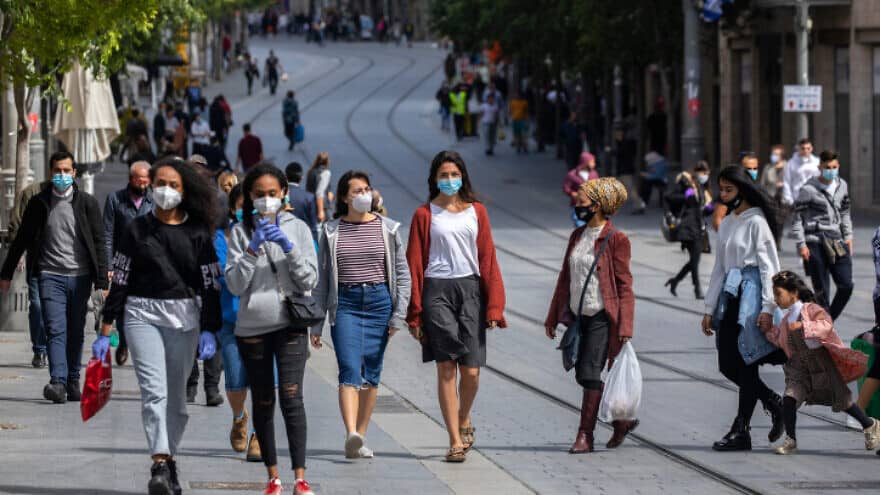 Israelis wearing face masks for fear of coronavirus do their shopping in Jerusalem City center after the government eased some lockdown measures that it had imposed in order to stop the spread of the coronavirus, on May 06, 2020.
Photo by Olivier Fitoussi/Flash90
Israelis wearing face masks for fear of coronavirus do their shopping in Jerusalem City center after the government eased some lockdown measures that it had imposed in order to stop the spread of the coronavirus, on May 06, 2020.
Photo by Olivier Fitoussi/Flash90
In my July 13 cover story, I painted a grim picture of a dysfunctional Israeli government. The polls show a very “sharp decline in the degree of trust of those charged with managing the coronavirus.” This includes Prime Minister Benjamin Netanyahu, Health Minister Yuli Edelstein as well as government health and economic professionals.
Of course, not everyone will agree with every government decision. So, the problem is not disagreement, it’s that many decisions seem politically motivated — such as sending checks to all Israelis, a small gift from the prime minister and Finance Minister Yisrael Katz.
One positive effect of the current, miserable state of affairs is that there is less speculation about a fourth round of elections. No one in the government wants new elections with such low public approval.
At some point, Netanyahu and Benny Gantz must be more cooperative and focused. If they can manage that, they will abide by the old Marxist notion that it must be bad before it gets better, or by the mutual realization that their respective political assets are quickly eroding. Considering this, a new election could be disastrous for both.
Gantz’s Blue and White party is in a nosedive. It was hit hard when it split (Yesh Atid and Telem remained in the opposition) and has been slowly declining ever since. In a few recent polls, the party didn’t even receive seats in the double digits.

For Netanyahu, a new election is a more viable option. But it is not a tempting one. His personal approval ratings are going down, the country is disrupted by angry protesters, and his Likud party also is losing ground. It is still the largest party and yet what happened to it in just a few weeks is a warning sign. Voters are angry with the government and are looking for alternatives. Likud gained when Netanyahu formed his unity government, but now it has lost almost 10 seats in two weeks. Even many Likud voters no longer trust the prime minister. His personal approval for handling the crisis declined among his own voters from 83% to 55% within a month.

Where did these lost seats go? Literally, they went “to the right” — the English translation of “Yamina,” the party headed by Naftali Bennet.
Netanyahu decided to keep Yamina out of his coalition, mainly because he dislikes its leaders: Bennet and Ayelet Shaked. He bought himself an effective rival and opposition from the right. Surprisingly, this opposition is not gaining because of Netanyahu’s failure to move forward with annexation, or because of any other decision concerning the core issues of Yamina. It is gaining because Bennet convinced the public, with eloquence and determination, that he would have been a much better handler of the coronavirus crisis.
Time and again Bennet hammers the government for being slow and hesitant, for not letting the defense ministry be in charge of the crisis — previously, because Netanyahu did not want Bennet in charge when he was defense minister, and now, because Netanyahu does not want Gantz in charge, when he is defense minister). Time and again he comes up with new ideas, new information, fresh thinking. His party received six seats on election day and is now getting 12-14 seats in the polls, many of which come from disillusioned Likud voters.
Of course, winning in the polls when there’s no election is one thing. Winning in an actual election is quite another. And yet, it is clear that the opposition is good for Bennet. He has no responsibility; he can’t be blamed for any wrongdoings. Just by being there and sounding serious and focused, he suddenly looks like a potential national leader.
In the final table: The current coalition with 73 seats is now projected to have just 62 seats. Had Netanyahu stuck with the right-religious bloc he’d have more seats (but no government, so this wasn’t really an option). Most parties who joined the coalition have lost seats since election day. All opposition parties gained seats.
Note that there is no Labor party in the table. Not one poll gives it a chance to cross the electoral threshold.
























 More news and opinions than at a Shabbat dinner, right in your inbox.
More news and opinions than at a Shabbat dinner, right in your inbox.